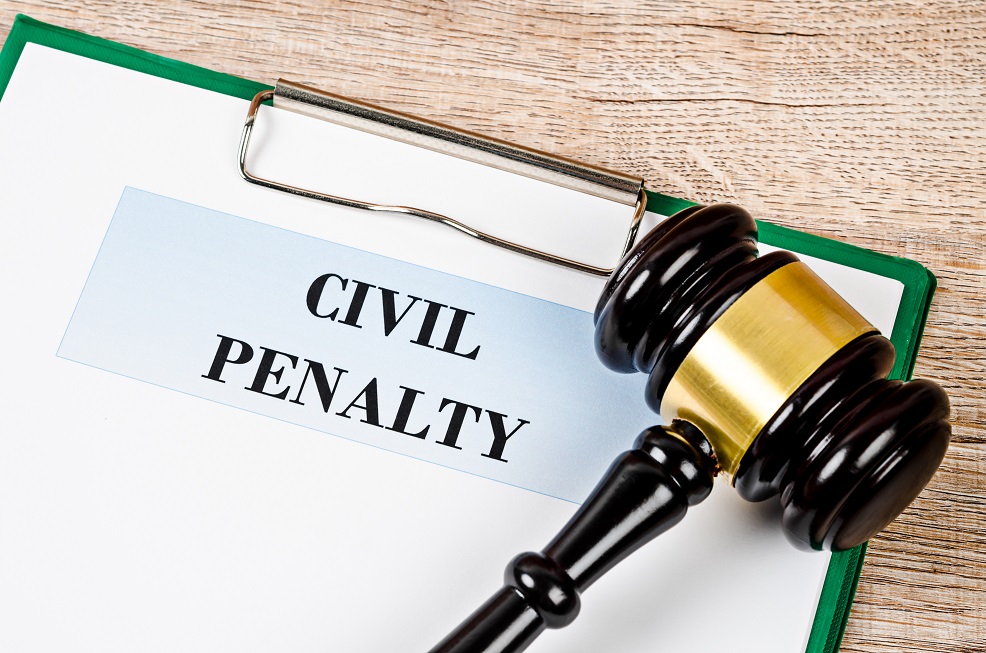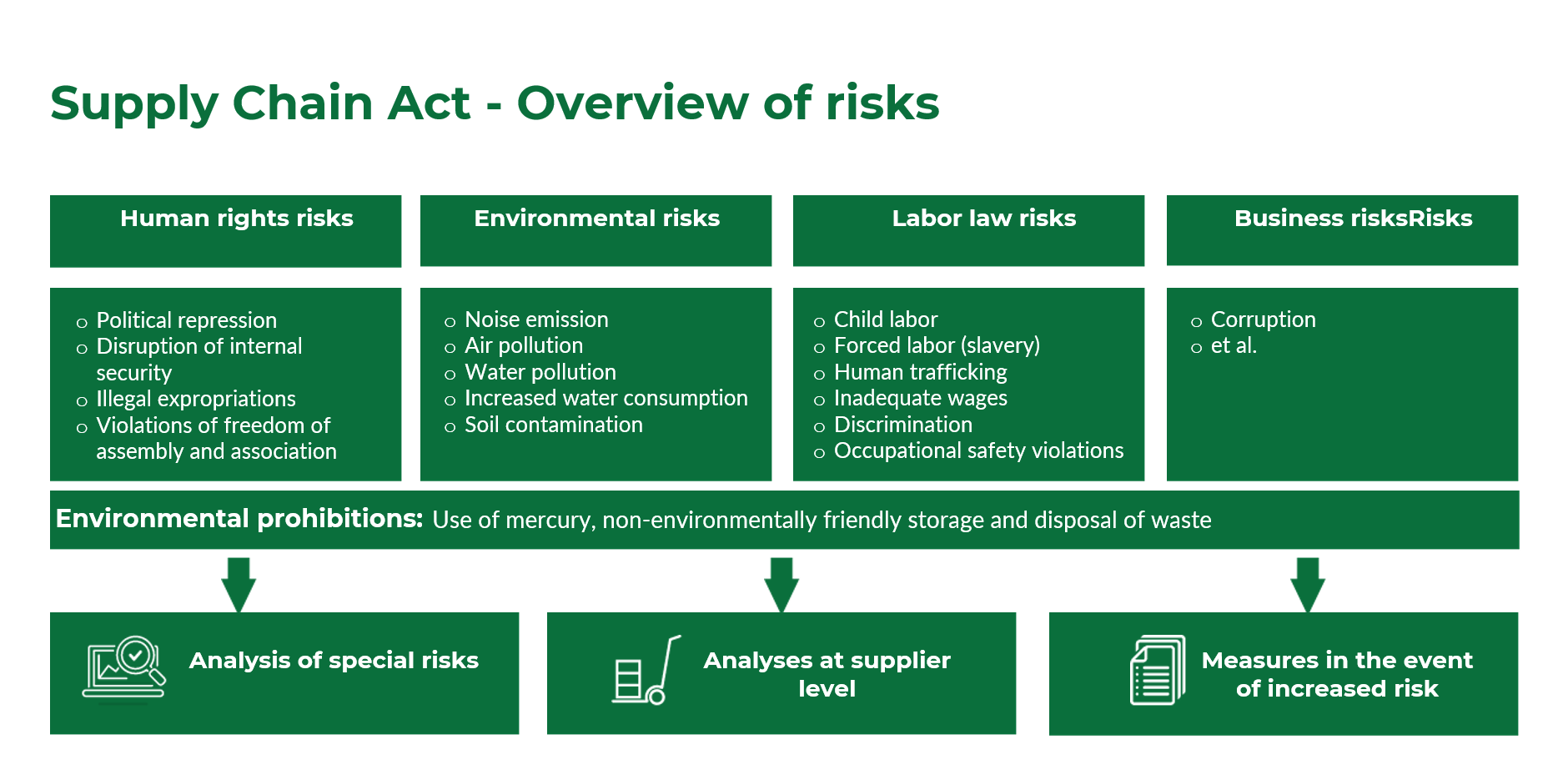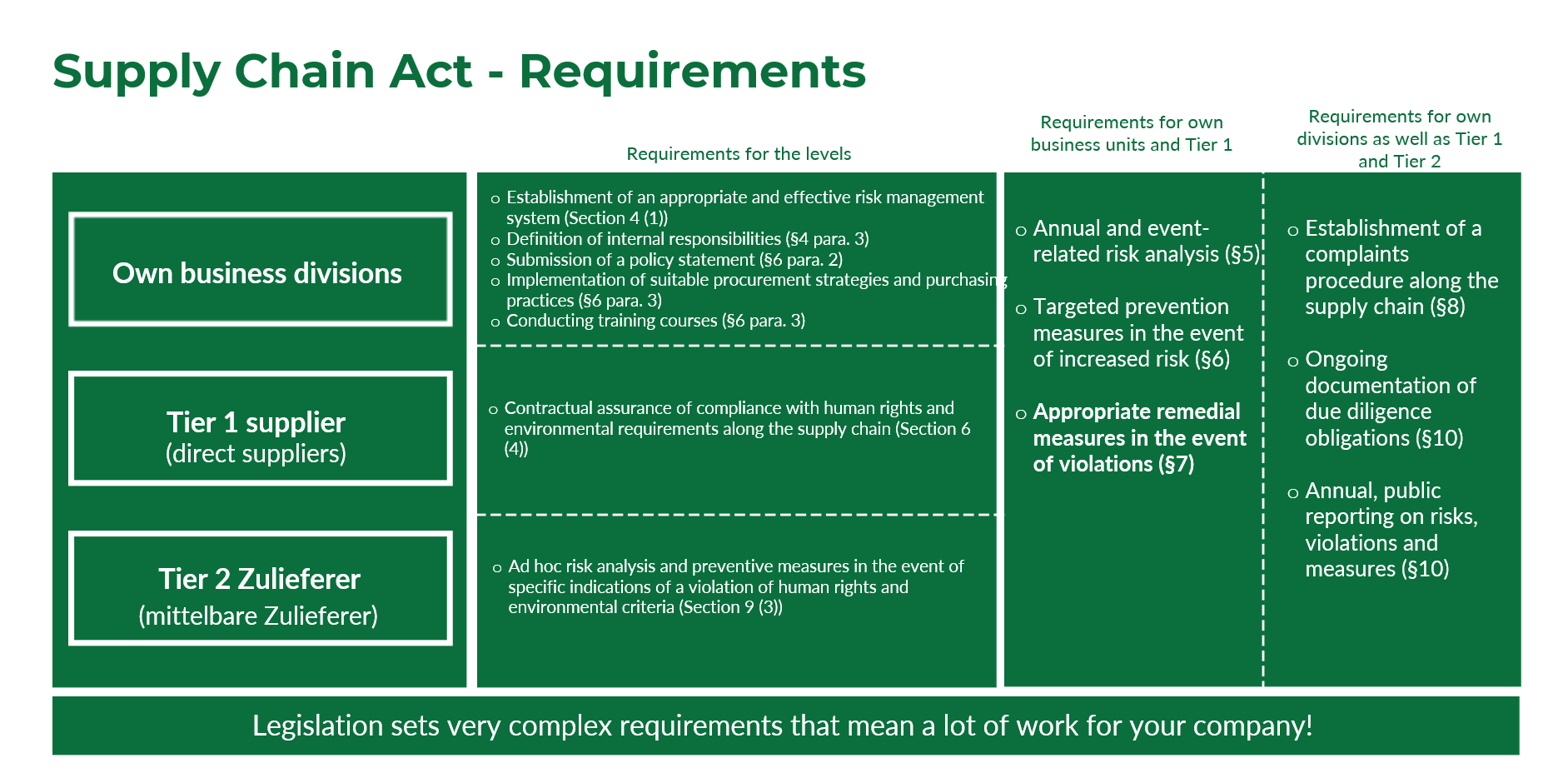Supply Chain Due Diligence Act (LkSG)
Legal foundations, laws and regulations
Supply Chain Due Diligence Act (LkSG)
Here you will find all important information about the Supply Chain Due Diligence Act (Lieferkettensorgfaltspflichtengesetz).
The LkSG is an important initiative to ensure an ethical and sustainable supply chain.
We provide you with a comprehensive overview of the Supply Chain Due Diligence Act and its requirements. Learn more about the background, the law itself, and the potential penalties for violations of the Supply Chain Due Diligence Act. In addition, we will inform you about the risks associated with non-compliance with the requirements. It is important that you are aware of the potential impacts this can have on your business operations.
As a company, you are obligated to deal with this issue and ensure that your business activities comply with national and international standards for human rights, environmental protection, and occupational safety. A violation of these standards can have serious consequences, both for those affected and for your company.

The initial situation
The Supply Chain Due Diligence Act (LkSG) is an important regulation aimed at ensuring compliance with human rights and environmental standards in global supply chains. The impact of this law is far-reaching, as it will affect companies of all industries and sizes. The LkSG is widely regarded as a long-awaited and important regulation that obligates companies to address conditions in their supply chains and ensure that the products they manufacture or distribute are not made at the expense of workers, the environment, or communities. The law ensures that companies take responsibility for their entire supply chain and ensure that the conditions in their factories, mines, and farms as well as those of their suppliers and subcontractors are appropriate. It aims to ensure that companies take active measures to ensure that their products and services are ethical and sustainable. Indeed, by ensuring that companies are responsible for their entire supply chain and are actively working to ensure that their products and services are ethical and sustainable, the LkSG can help to build consumer trust in products and companies. Consumers are increasingly concerned about the origin and conditions of their products, particularly with regard to the exploitation of workers and environmental impacts. The LkSG will encourage companies to review their supply chains and change their business practices to address these concerns. Furthermore, the LkSG will assist companies in identifying and mitigating risks and challenges in their supply chains. The LkSG will assist companies in enhancing their compliance programs to ensure that they are not involved in human rights or environmental standard violations. It will also help companies strengthen their reputation as ethical and responsible actors. Companies that implement the LkSG early on will also benefit from a competitive advantage. They will be able to stand out from competitors who are not able to implement ethical and sustainable business practices in their supply chains. They will also be able to open up new business opportunities by offering their customers products based on ethical and sustainable principles.
The law
The Supply Chain Due Diligence Act (LkSG) is a German law that came into effect on January 1st, 2023. It obliges companies based in Germany and with an annual turnover of more than 400 million euros to review their supply chains for human rights violations and environmental offenses and to take appropriate measures to avoid or remedy them. The law applies to companies along the entire supply chain, including both direct suppliers and companies further downstream in the supply chain. Companies must conduct a risk analysis to identify potential risks in their supply chain and take appropriate measures to minimize these risks, if necessary. The LkSG also provides for the possibility of sanctions and fines in case of non-compliance with due diligence obligations. The aim of the law is to encourage companies to strengthen their commitment to human rights and environmental protection throughout their supply chains and thus help reduce the global problems of human exploitation and environmental damage.
In case of violation
If companies violate the Supply Chain Due Diligence Act, they can expect various consequences depending on the severity of the violation.
Possible consequences are:
- Publication of violations: The law provides that companies that violate due diligence obligations may be publicly named. This can lead to significant damage to the company’s reputation.
- Companies can be fined up to 2% of their annual revenue. In case of particularly serious violations, the fine can amount to up to 4 percent of the company’s annual turnover.
- Companies can also be faced with compensation claims from those affected or harmed by violations of the law.
- Companies that violate the law can be excluded from public procurement.
- In particularly serious cases of violations of the law, criminal consequences may also follow for the individuals and companies involved.
It is important for companies to comply with the due diligence obligations of the Supply Chain Due Diligence Act in order to avoid these consequences and to contribute to a more sustainable economy.
Overview of the risks to be assessed
The Supply Chain Due Diligence Act (LkSG) requires companies to review their supply chains for human rights and environmental risks and to take measures to avoid or minimize them. The risks to be considered include a variety of areas, which will be explained in more detail below.
Human rights risks: Companies must ensure that they do not cause or benefit from human rights violations in their supply chains. This includes, for example, forced labor, child labor, discrimination, restriction of freedom of expression, assembly and association rights, as well as working conditions that do not meet national and international standards.
Risks to the environment: Companies must ensure that their supply chains do not harm the environment and promote sustainability. This includes, for example, violations of environmental standards, such as uncontrolled waste disposal, illegal deforestation, emission of greenhouse gases and other pollutants, as well as overuse of resources.
Social risks: Companies must ensure that their supply chains do not contribute to or exacerbate social problems. This includes, for example, corruption, bribery, smuggling, arms trafficking, organized crime, and terrorism.
Risks in the supply chain: Companies must ensure that their supply chain is robust and resilient to counter possible failures and delays. Some examples of these risks include supplier failures, lack of transparency in the supply chain, technological weaknesses, infringement of intellectual property, as well as unforeseen events such as natural disasters and political unrest.
Companies must ensure that they identify all relevant risks in their supply chains and take appropriate measures to minimize or avoid them. Companies can conduct a risk analysis, review their suppliers, and provide training to their employees, among other measures, to identify all relevant risks in their supply chains and take appropriate actions to minimize or avoid them. The LkSG ensures that companies fulfill their responsibility for a sustainable supply chain and thus contribute to a better future.

Requirements for business units, direct and indirect suppliers
The Supply Chain Due Diligence Act (LkSG) sets clear requirements for companies to ensure a sustainable supply chain. These requirements can be divided into three categories: requirements for the company’s own business areas, for immediate suppliers, and for indirect suppliers.
Requirements for the company’s own business areas: Companies must ensure that their own business areas comply with national and international standards for human rights, environmental protection, and occupational health and safety. They must, for example, offer regular training for their employees, define and monitor environmental and social standards, and conduct internal audits to achieve this. This follows from §3 paragraph 1 LkSG.
Requirements for immediate suppliers (Tier 1): Companies must ensure that their immediate suppliers also comply with national and international standards for human rights, environmental protection, and occupational health and safety. To do this, you must perform a risk analysis and regularly check your suppliers to ensure compliance with these standards. In case of violations, they must take appropriate measures to remedy the situation. This follows from §3 Paragraph 2 of the LkSG.
Requirements for indirect suppliers (Tier 2): Companies must also include their indirect suppliers in the verification process if they are aware of any risks in their supply chain. To do this, they may need to obtain information on the entire supply chain up to the raw material supplier, and ensure that they also comply with national and international standards. This follows from §3 Paragraph 2 of the LkSG.
By fulfilling these requirements, companies can ensure that they maintain a sustainable and ethically sound supply chain. The LkSG ensures that companies fulfill their responsibility and thus contribute to a better future.

Scopewire is the ideal partner for medium-sized companies looking for a simple, reliable, and legally compliant implementation of the requirements of the Supply Chain Due Diligence Act (LkSG). With our powerful tool, we offer you a cloud-based solution that helps you monitor your supply chain and ensure that your suppliers and business partners comply with legal requirements.
Our LkSG tool allows you to easily collect and analyze the necessary data to optimize your supply chain and minimize the risk of non-compliance with the LkSG. Thanks to our user-friendly interface and expertise in supply chain management, using our LkSG tool is incredibly easy. You don’t need any knowledge and can start right away. In doing so, you not only save time but also costs, as you do not require expensive IT systems or additional personnel.
Request a demo of our tool today and let our experts advise you!
Join the Scopewire family now and experience how easy and effective supply chain management can be!